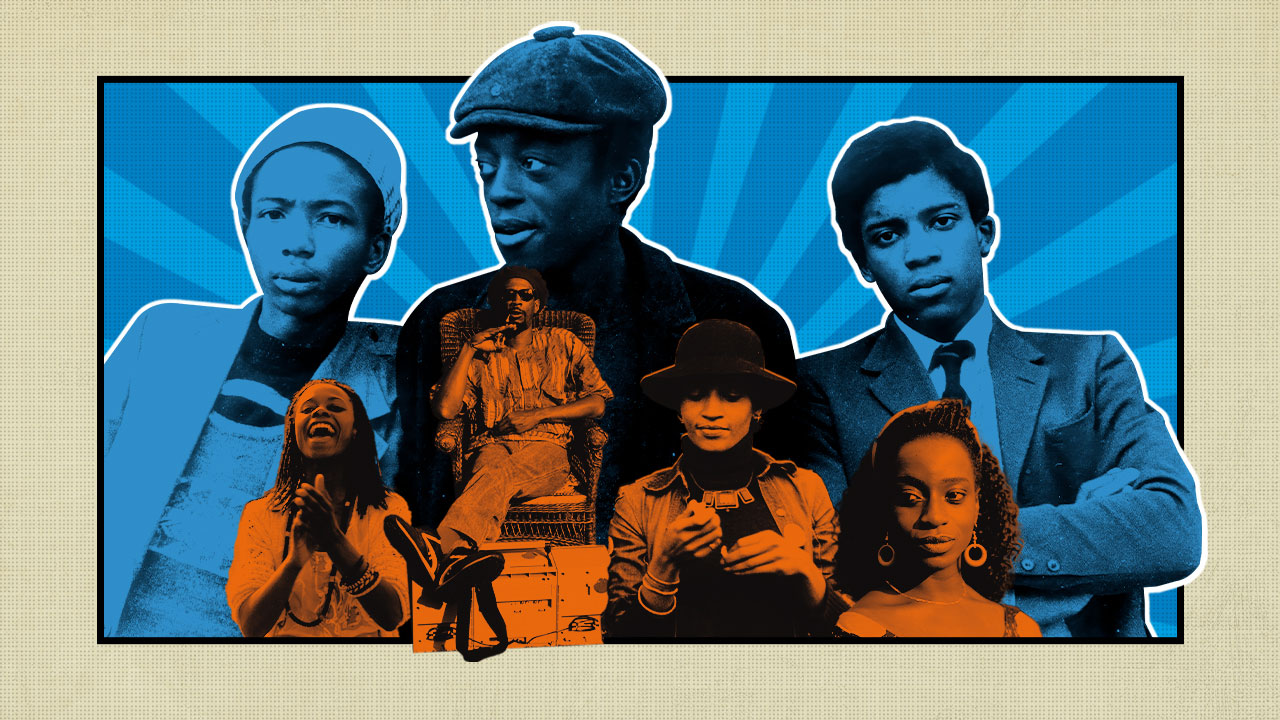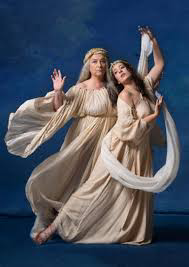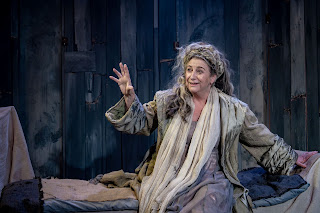Among the most joyous screenings at this year's New Horizons Film Festival last month was that of Agnieszka Zwiefka's Vika! (2023), a documentary dedicated to the life and work of the Warsaw-based octogenarian Wirginia Szmyt, a former teacher and correctional facility director turned Poland's (and, let's face it, probably the world's) oldest DJ.
Combining stylised music video-inspired sequences with footage of Vika on the decks at Pride marches and parties in Poland and abroad, plus intimate reflections on her complicated family relations, lockdown isolation (and bonus appearances from her hilariously troublesome cat), Zwiefka's film celebrated Vika as a figure whose energy and zest for life not only challenge ageist stereotyping but who also unites diverse demographics - groups that many (not least the mainstream media) prefer to present as irredeemably polarised right now.
 |
| Vika! (2023) |
As usual taking place at Fabryka Sztuki and other venues in Łódź across 10 days in August, Teatr CHOREA's Retroperspektywy International Theatre Festival (RPS) this year took as its theme the subject of "Generations," exploring conflicts, correspondences, and, in the words of Artistic Director Tomasz Rodowicz, "attempts to find oneself in intergenerational relationships." (Evidently the topic is of particular concern to Polish creatives and curators at present, since this year's Hommage a Kieślowski festival, which happened in Sokołowsko concurrently with RPS, also chose "Generations" as its theme.) Given the festival's focus, the appearance of DJ Vika at the RPS final Friday party was perfect; the DJ brought the youngest and oldest attendees to the dance floor with a fun, eclectic set that spanned styles and decades.
I've attended Retroperspektywy for the past 5 years, always finding it among the most multifaceted, inclusive and carefully curated of festivals. If anything, those qualities seemed enhanced this year - perhaps appropriately, given the festival's theme. This 12th edition was one of the strongest yet, as the programme encompassed plays, puppetry, concerts, dance, an exhibition of work by young artists from Jola Królicka's studio at the MSK Art Centre, a series of intergenerational ecological workshops, and meetings with creatives after each event. (Sadly, one much anticipated performance, Łukasz Kos's new take on An-ski's Dybuk, had to be cancelled due to an accident.)
 |
Księgi niepokoju.
Stanisław / Antoni / Fernando |
The opening premiere, Księgi niepokoju. Stanisław / Antoni / Fernando (Books of Disquiet. Stanislaw / Antoni / Fernando), directed by and starring Rodowicz alongside two charismatic young performers, Antoni Wójcik-Urbaniak and Stanisław Ginalski, perfectly established the Festival theme, using a sustained chess metaphor to dramatise intergenerational tensions and moments of complicity.
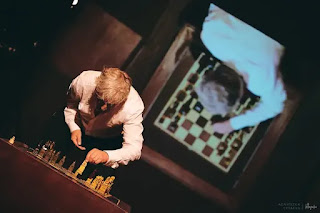 |
Księgi niepokoju.
Stanisław / Antoni / Fernando |
Lower-keyed and more distilled than some CHOREA opening shows, the piece nonetheless proved stimulating, incorporating translated text by Fernando Pessoa, clever set and costume design by Królicka, and - perhaps inevitably - a Seventh Seal homage, as well as benefiting hugely from Rodowicz, Wójcik-Urbaniak and Ginalski's evident rapport.
 |
| I am OK |
Like last year's edition, the Festival again boasted a significant Ukrainian presence, presenting two shows by Kharkiv State Academic Puppet Theatre. These productions were both directed by Oksana Dmitrieva, and each was finely attuned to the very different demands of the material.
I am OK was raw, direct and immediate in its focus on the diverging fates of four teenage friends (played by Liliia Osieichuk, Serhii Smerechuk, Oleksandra Kolesnichenko, and Yakiv Ozerovin) in Bucha from the first days of the Russian invasion; it wasn't surprising to see some audience members openly weeping by the show's climax.
 |
| Vertep |
Vertep, by contrast, tapped into a deep well of ritual and tradition. Named in reference to the Ukrainian portable puppet theatre which presents the nativity story and mystery plays, and which was suppressed by the Soviet state, the performance was full of rich symbolism, soulful singing and creative design.
 |
| Ściana z widokiem |
Teenage experience in a contemporary context was also explored in Grupa Coincidentia's Ściana z widokiem (Wall with a View), an idiosyncratic, wild but tender portrait of teenage lockdown loneliness. The prize-winner of the Artistic Event for Children and Youth Project, the show was undertaken in collaboration with Children's Art Centre in Poznań under the auspices of the 23rd Biennale of the Art for Children, but doesn't shy away from darker emotions. Still, the show placed emphasis on the saving possibilities of creativity and imagination.
Staged in traverse, with well-incorporated multimedia elements, and director and designer Konrad Dworakowski on stage to add musical accompaniment alongside composer Robert Jurčo, the performance boasted a great central "duet" by the briskly multi-roling Dagmara Sowa and by Paweł Chomczyk as the troubled teen.
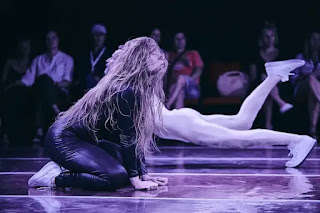 |
| IV RP Snów |
Several ambitious pieces in the programme used dance to express and meditate on existential anxieties. I wasn't convinced by Stowarzyszenie Sztuka Nowa's IV RP Snów (4th Republic of Dreams), directed by Dawid Żakowski and choreographed by Wojciech Grudziński. Despite the clear commitment of its supple trio of performers (Ewelina Sobieraj, Borys Jaźnicki, Michał Tokarski), the production teetered between arresting and risible, and succumbed to the latter in a key section scored to Diana Krall's uniquely painful rendition of "Cry Me a River."
 |
BUD
(Photo: Øystein Haara)* |
On the other hand, BUD, presented on the large stage at Teatr Pinokio by the Bergen-based Carte Blanche - Norwegian National Company of Contemporary Dance as part of the ongoing ACT IN_OUT collaborative project, was explosively effective.
Directed and choreographed by Roza Moshtagi, the gripping piece combined elements of dance and installation art to explore the condition of waiting and suspended time - its performers (Irene Vesterhus Theisen, Ole Martin Meland, Aslak Aune Nygård, Anne Lise Rønne, Trine Lise Moe) variously sitting, laying, convulsing, or racing in the space. Enhanced by a soundscape that veered from otherworldly chants to pounding industrial noise (music is by Lykorgous Porfyris), BUD is a major, original piece of work that deserves wide international attention.
 |
| Full Measures |
Also highly distinctive was Full Measures by Finland's Livsmedlet director/ choreographer/puppeteer/performer duo Sandrina Lindgren and Ishmael Falke, which examined the human compulsion to quantify and measure sundry aspects of life experience as a form of control.
Initially I was reminded a bit of the great central section of Martin Crimp's unloved play In the Republic of Happiness, as Lindgren and Falke communicated through a volley of exchanged averages, stats and percentages, delivered in an amusingly deadpan fashion that gestured at social critique. But the piece evolves into something quite other in its frenzied, frantic later section. Throughout, a multitude of measuring sticks are employed as versatile and expressive aids and props, finally forming a forest that might, perhaps, be a space for our beleaguered protagonists to begin anew.
 |
| Morze ∞ możliwości |
Generally exploring darker themes, puppetry has indeed often been a vital component of the festival over the years, testifying to Poland's exceptional creativity in this field. But this year's standout puppet performance, Fundacja Gra/nice's Morze ∞ możliwości (Sea of ∞ Possibilities), proved a bewitchingly gentle affair.
 |
| Morze ∞ możliwości |
Freely adapted from Kobi Yamada's book Maybe, this was a calming, beautiful family show that offered pure Sunday lunchtime enchantment, following its enterprising, wide-eyed protagonist (designed by Justyna Bernadetta Banasiak) through various tasks and attempts, as they learn the value of trying again, and develop their potential. With a twinkling soundscape, and a simple video camera projecting elements of the set, the design conjures forest, ocean and mountainside up to to a final flight, and the show charmed audience members of all ages from beginning to end.
 |
| Rejs |
Two outstanding ensemble concerts book-ended this year's festival, both comprised of music composed and arranged by the esteemable Piotr Klimek - one of the undisputed heroes of this year's event. (Another hero would be the festival's tireless General Coordinator, Anna Maszewska.) Written, directed and conceived by Dworkowski, the first concert, Rejs (Cruise), brought together a diverse crew of performers as the MUR/BETON & Gadający Pies (CONCRETE/WALL & Talking Dog) collective to take the audience on a journey through the courtyards of Łódź history as a wider metaphor for human experience.
 |
| Rejs |
Unpredictable weather forced the concert from its intended outdoor location on to a smaller inside stage that made the set-up seem slightly cramped. But the exhilarating, ramshackle energy of the piece still steamed through, with brilliantly sung contributions from CHOREA regulars Joanna Chmielecka and Michał Jóźwik, among others.
 |
Marja Mortenssen in
Livet. Suita dla Ziemi |
Chmielecka and Jóźwik were also among the exceptional company assembled for the premiere performance of Livet. Suita dla Ziemi (Life. Suite for the Earth), which was the Festival's soul-shakingly great culmination at the University of Music Concert Hall on Sunday night.
Also part of the ACT IN_OUT project, and produced by Ola Shaya, this concert united Polish, Norwegian, Ukrainian and Bulgarian artists in an evening of song, with narration and spoken word interludes by the great Norwegian actress
Juni Dahr, appearing throughout like a particularly graceful woodland spirit to delivery the poetry. (Alongside Erik Hillestad and Tomasz Rodowicz, Dahr was also co-director of the piece.)
 |
| Livet. Suita dla Ziemi |
Indeed, themes of human connection to nature were central, in a work dedicated to celebrating the uniqueness of the planet and all that lives on it. The evening opened with the elegantly black-clad, barefoot ensemble of singers sitting in a circle before rising to take their places alongside a band comprised of Tord Gustavsen (piano), Eivind Aarset (guitar), Tore Brunborg (tenor sax), Hubert Zemler (percussion) and Piotr Rodowicz (double bass).
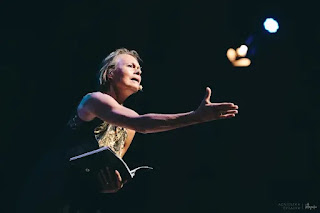 |
Juni Dahr in
Livet. Suita dla Ziemi |
Inspired by traditional music from all four countries, the show had a beautiful, seamless flow, placing tradition and modernity in dynamic dialogue through a fusion of folk, jazz and rock elements, supported by the amazing harmonies of the 13-strong choir.
 |
Piotr Klimek in
Livet. Suita dla Ziemi |
The all-female soloists brought different yet complementary energies to the evening - from the extraordinary, ebullient Saami joiks of Marja Mortenssen, embodying aspects of the natural world, to the heart-piercing tone of Elina Toneva, specialist in Bulgarian folk-singing, and the theatrical, impassioned style of Zoriana Dybovska, reaching back with intensity and pride into Ukrainian roots.
 |
Zoriana Dybovska in
Livet. Suita dla Ziemi |
With voices soaring in lament or exaltation, complemented by some atmospheric lighting design, the effect was overwhelmingly powerful; the performers also radiated a mutual warmth, respect and love that was heart-warming to witness. As Dahr remarked in an interview: "We are in a very difficult moment in Europe. This is the right moment to join forces, create music, poetry, art together and thus give each other a little faith in the future."
 |
Elina Toneva in
Livet. Suita dla Ziemi |
A profound and transformative spiritual experience, Livet bestowed precisely that kind of faith. The concert represents art-making at the highest level, and deserves the widest possible international exposure. (October will see a second performance of the piece in Oslo, and an audio recording will be available soon.) It was an exquisite and unforgettable conclusion to a festival that creatively approached the theme of generations in all manner of resonant ways, adding up to an essential edition of Retroperspektywy that can best be described as one for the ages.
 |
| Livet. Suita dla Ziemi |
The 12th Retroperspektywy Festival took place between 18 - 27 August 2023.
With the exception of the image of BUD by Øystein Haara, all performance photos are by AGNIESZKA CYTACKA FOTOGRAFIA










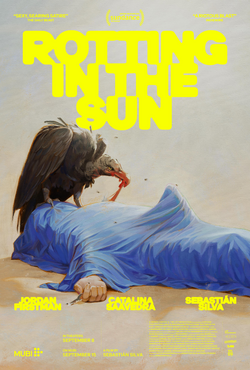
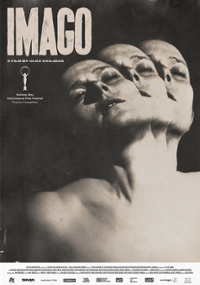


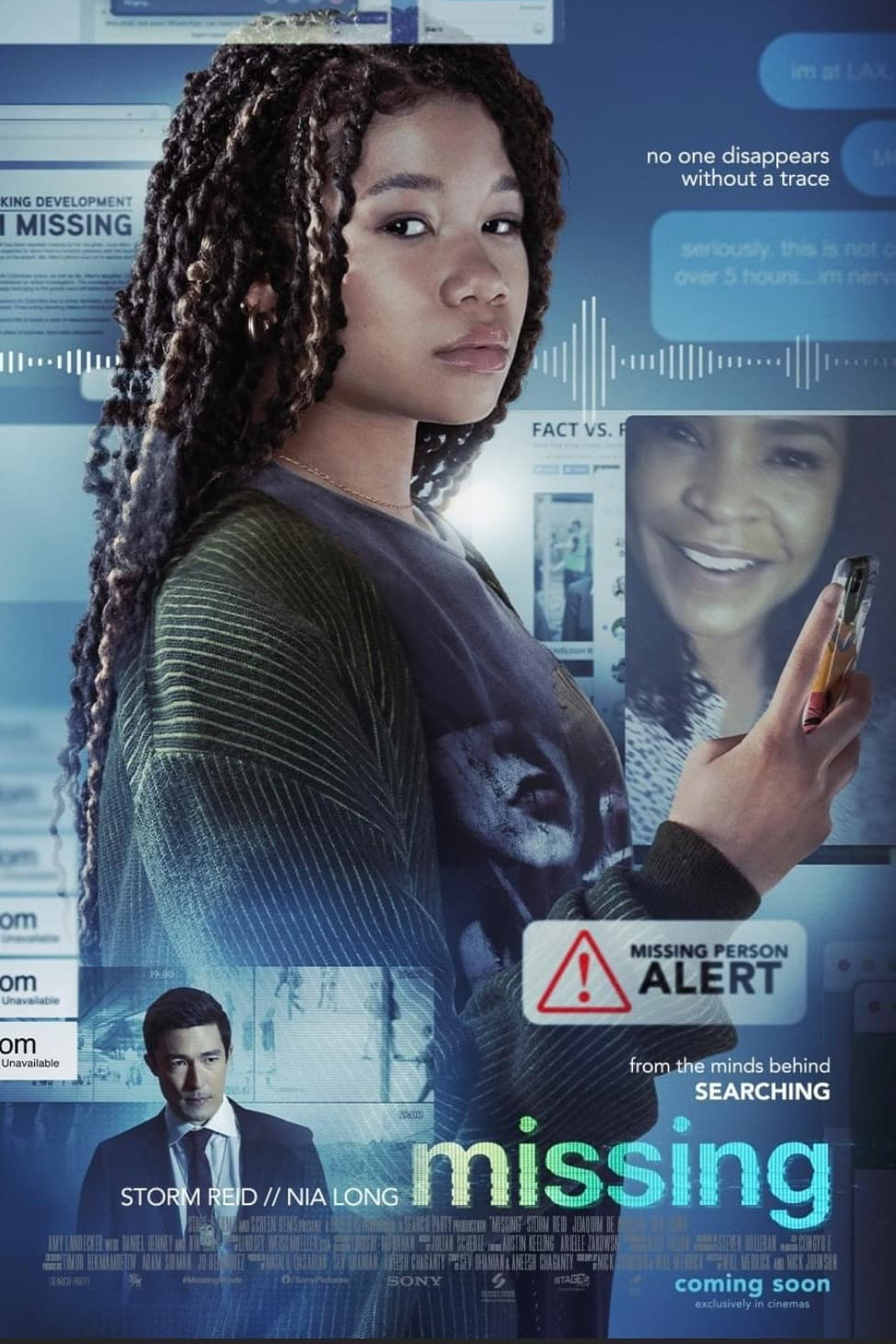
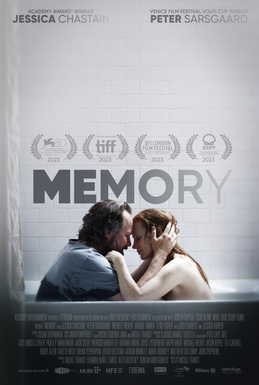

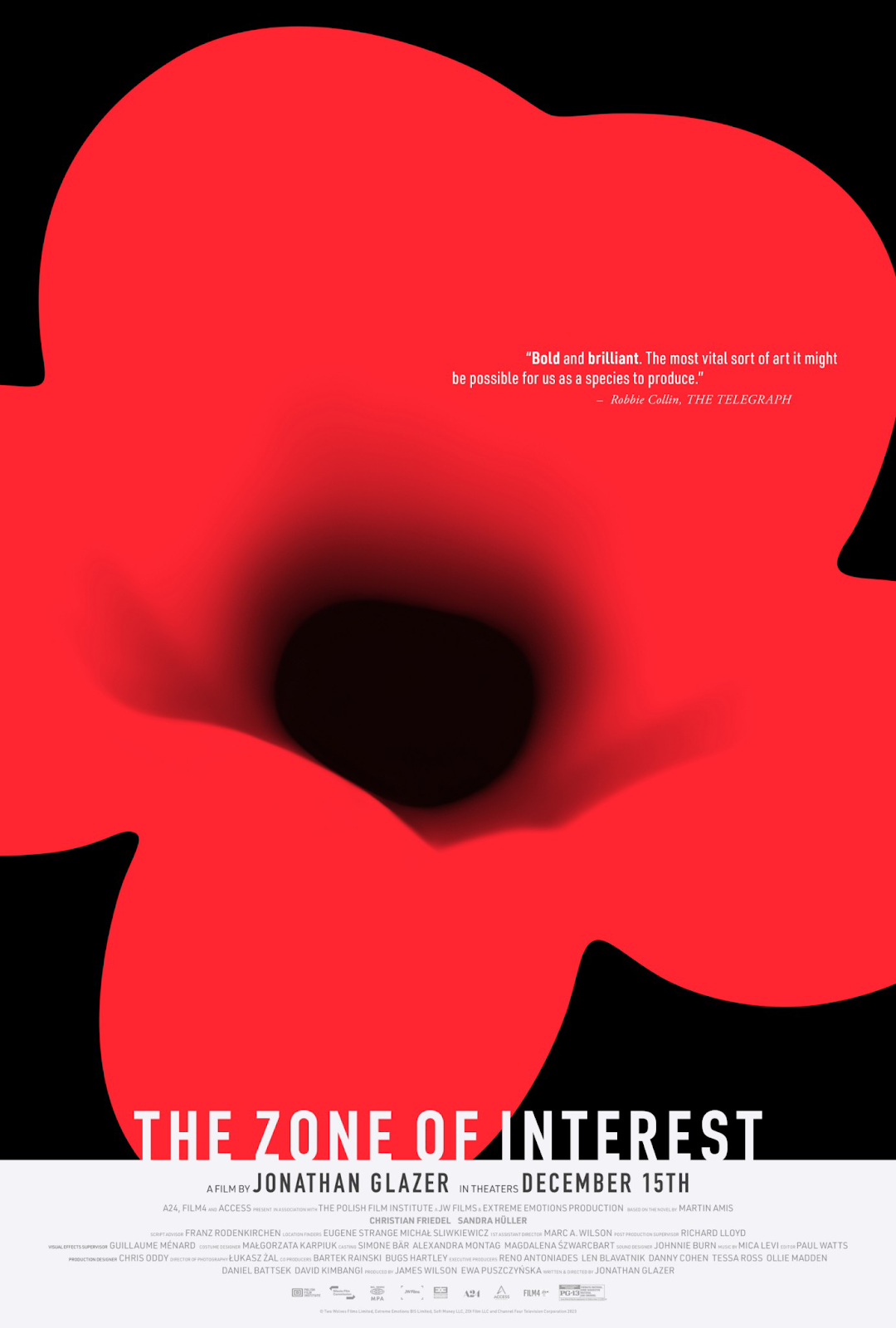

.jpg)


